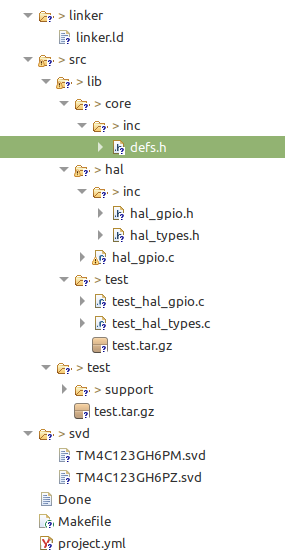Hi, I would start by ensuring the proper flags are set when compiling and linking on the PC with gcc. What are your compiler and linker flags on the target build? Check the product code build log. Step 1 when using a HAL or 3rd party software is to ensure the compiler and linker have the proper MCU and other build flags so the proper 3rd party code will be included in the unit test build. Most HALs and 3rd party software have flags to select a particular HAL implementation for your MCU. Sometimes you run into compiler/linker issues with flags that the PC gcc compiler will not support, and then you have to get creative to get the unit test build to work. The yml file :defines: section must have the proper build flags for the HAL.
I am creating HAL library for my project. I have a very simple project structure. I have shown this project structure in the picture below.
I created a "hal_gpio.h" file containing a GPIO memory map based on the MCU's datasheet. I wrote a few test functions in it, but when I run ceedling test:all I get an undeclared variable error from test_hal_gpio.c. Console output as shown below. I think the problem is 99% not related to the library, but I've been dealing with this for the last 1 week and I'm confused on what to do out of desperation. I am open to all help.
-Project structure
-Console output
-defs.h
-hal_types.h
-hal_gpio.h
-hal_gpio.c
-test_hal_gpio.c
-project.yml